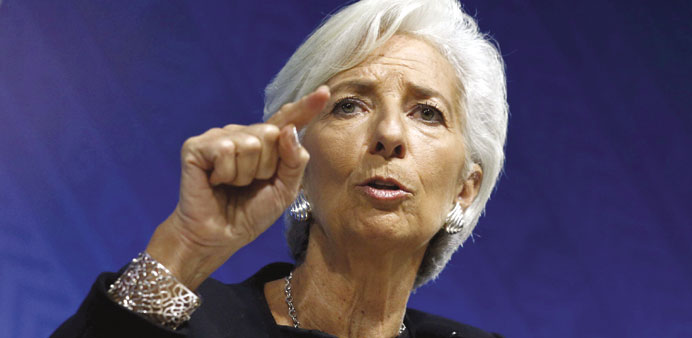IMF managing director Christine Lagarde speaks during a news conference during the 2015 IMF/World Bank Annual Meetings in Lima, Peru yesterday. Slowing of economic activity in China and recent market volatility were having larger-than-expected spillovers across the global economy, she said.
Reuters/Lima, Peru
International Monetary Fund chief Christine Lagarde urged global policymakers yesterday to support economic growth while also tackling financial risks stemming from the provision of easy money amid a “rapidly changing and uncertain world.”
Lagarde, presenting a Global Policy Agenda at the fund’s annual meeting in Peru, said a recovery in the US was broadly on track and a rise in US interest rates “is approaching” and would tighten global funding conditions.
But she added that the slowing of economic activity in China and recent market volatility were having larger-than-expected spillovers across the global economy.
Emerging economies, which have contributed the bulk of world growth in recent years, have been hit hard by a slump in commodity prices.
“Policymakers are increasingly grappling with difficult policy trade-offs,” Lagarde said, calling for a careful mix of policies to support economic demand, while also tackling financial risks and reforming economies to deliver future growth.
The IMF cut its global growth forecast to 3.1% this year and 3.6% in 2016, the second downgrade this year even after central banks in major industrial economies have cut rates to near zero and spent around $7tn in quantitative easing programmes in the seven years since the global financial crisis.
Despite these measures, investment, growth and productivity are stuck below pre-crisis levels and there is a lack of consumer demand.
“An extended period of monetary accommodation in advanced economies has led to pockets of financial vulnerabilities,” Lagarde said, adding: “Safeguarding financial stability while promoting real investment remains a major policy challenge.”
Despite the risks associated with central banks’ provision of cheap money, Lagarde said economic slack and low inflation justified the continuation of such monetary policies in major advanced economies, specifically in the eurozone and Japan.
The IMF has urged to the Fed to wait for more signs of recovery before hiking.
“Fiscal policy needs to be more supportive where conditions allow,” she added, pointing to Germany and the Netherlands.
Lagarde and the US Treasury have both previously called on Germany to stimulate its domestic demand to help support its peers, but their message has largely been rebuffed by Berlin.
Turning to emerging economies, Lagarde said their room for policy manoeuvre to support demand is narrowing, with commodity exporters facing a painful adjustment due to rising financial vulnerabilities, low prices for their products, and deteriorating public finances.
Flagging a risk to the world outlook, she said emerging market and developing economies were particularly vulnerable to shifting global tides as they face tighter financing conditions, slowing capital inflows and currency pressures.
“This could create spillovers and spillbacks into advanced economies,” she said.

